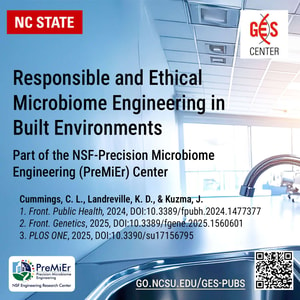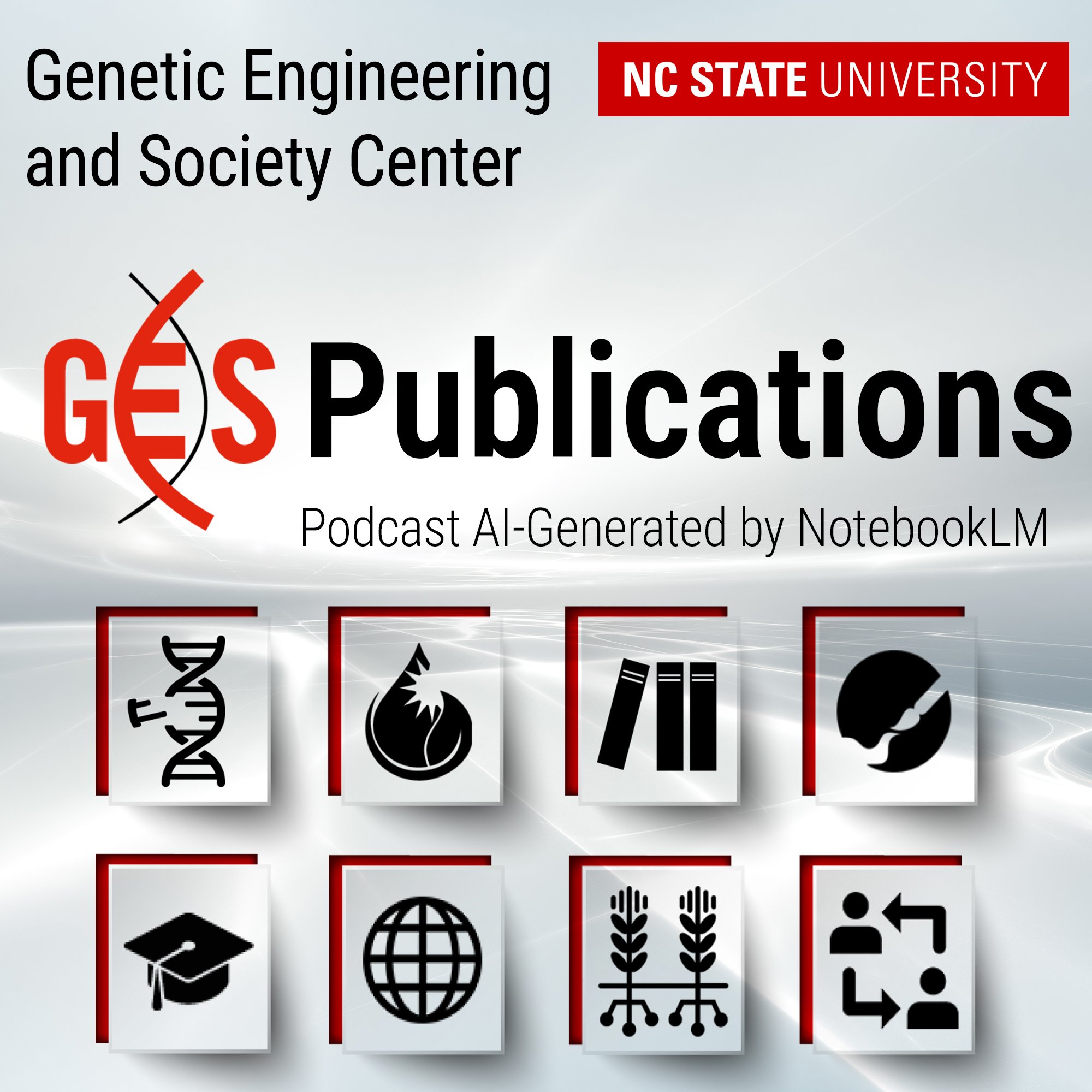S1E2 - PreMiEr: Responsible Microbiome Engineering in Built Environments

Commentary and overview of GES Center publications, AI-generated by NotebookLM
PreMiEr: Responsible Microbiome Engineering in Built Environments
This episode of the GES Publications podcast provides an AI-generated overview of the three articles below, highlighting key findings and insights into the societal dimensions of biotechnology. Episodes are created using Google Gemini’s NotebookLM to summarize faculty and student publications from NC State University’s Genetic Engineering and Society Center.
DOWNLOAD FULL PODCAST TRANSCRIPT HERE.
Learn more about the NSF-PreMiEr project here.
Authors
Christopher L. Cummings, Kristen D. Landreville, and Jennifer Kuzma
Citation 1
Cummings C.L., Landreville K.D., and Kuzma J. (2024). Taking the temperature of the United States public regarding microbiome engineering. Front. Public Health. 12:1477377. https://doi.org/10.3389/fpubh.2024.1477377. PDF. Graphic
Abstract
This paper presents the first representative survey of U.S. adults’ opinions on microbiome engineering within the built environment, revealing public awareness, perceived benefits and risks, and attitudes toward genetically engineered microbiomes. Using data from a cross-sectional survey of 1,000 nationally representative U.S. residents over 18 years of age, we examined demographic and cultural factors influencing public sentiment. Results indicate that younger generations report higher knowledge levels, optimism, and perceived benefits of microbiome engineering, while older generations exhibit more caution and concern about risks. Political affiliation, education level, and trust in science also shape public attitudes, with Democrats, college-educated individuals, and those with higher trust in science more likely to view microbiome engineering positively. Notably, nearly half of respondents across demographic groups remain uncertain about the technology’s benefits and risks, and a majority of participants support government oversight to ensure ethical and responsible development. These insights provide a foundation for policymakers and researchers to foster informed public engagement and guide responsible innovation in microbiome engineering for built environments.
Citation 2
Cummings, C. L., Landreville, K. D., & Kuzma, J. (2025). Natural vs. Genetically engineered microbiomes: Understanding public attitudes for indoor applications and pathways for future engagement. Frontiers in Genetics, 16, 1560601. https://doi.org/10.3389/fgene.2025.1560601. PDF. Graphic
Abstract
This study examines public preferences for natural microbiomes and support for genetically engineered (GE) microbiomes in the built environment, focusing on the demographic, sociographic, and attitudinal factors that influence these preferences. Using data from a nationally representative survey of 1,000 U.S. adults, we employed hierarchical regression analyses to assess the relative contribution of these variables. While demographic and sociographic factors explained limited variance, topic-specific attitudes, including positive perceptions of microbiome engineering’s potential to improve quality of life, were the most significant predictors of support. Conversely, age, distrust in science, and perceived knowledge negatively influenced support for GE microbiomes, reflecting skepticism among some audiences. The findings highlight the potential of the Responsible Research and Innovation (RRI) framework to align the development of microbiome engineering with societal values and to address diverse public perspectives. This research provides actionable insights for policymakers, researchers, and communicators seeking to navigate the complexities of public engagement with emerging biotechnologies.
Citation 3
Cummings, C. L., Landreville, K. D., & Kuzma, J. (2025). Public perceptions and support for introduced microbes to combat hospital-acquired infections and antimicrobial resistance. PLOS ONE, 20(10), e0332578. https://doi.org/10.1371/journal.pone.0332578. PDF. Graphic
Abstract
Hospital-acquired infections and antimicrobial resistance (AMR) remain major global health threats, prompting interest in microbiome-based interventions that introduce beneficial microbes or genetic interventions to control pathogens and reduce AMR genes in hospital environments. Microbiome engineering, which can use advanced biotechnology, genetics, and microbial ecology principles to restructure microbial communities, is a rapidly growing field with applications in infection control. As researchers explore deploying beneficial microbes and other genetic interventions in clinical settings like hospital sinks, public perception becomes critical to responsible implementation. This study addresses how U.S. adults perceive microbiome evaluation and education. Drawing on a nationally representative survey (N = 1,000), we conducted hierarchical ordinary least squares regression modeling to assess predictors of support across three domains: implementation of introduced microbiomes (IM), rigorous testing, and education for healthcare stakeholders. Results demonstrate that support for IM in hospital sinks is shaped less by demographic traits and more by emotional responses, trust in institutional efficacy, belief in intervention benefits, and a desire to learn about microbiome science. These findings advance previous knowledge by distinguishing cognitive, affective, and contextual predictors across distinct types of support. Contrary to expectations, prior familiarity and information-seeking were negatively associated with IM support, suggesting that some engagement or exposure to risk-framing may drive skepticism. Meanwhile, emotional reactions and perceived efficacy consistently predicted support for IM, testing, and education (i.e., across all dependent variables), underscoring the need to address affective and trust-based components of public engagement. This research contributes to an emerging empirical foundation for responsible microbiome innovation by grounding the analysis in the Responsible Research and Innovation (RRI) framework. With the technology still in early development, these insights provide critical guidance for biotechnology developers, policymakers, and hospital leaders seeking to align microbiome engineering with societal values through transparent communication, rigorous oversight, and inclusive education.
Genetic Engineering and Society Center
Explore More
- Browse the full GES publication library: go.ncsu.edu/ges-pubs
- Learn about the GES Center: go.ncsu.edu/ges
- For live recordings from our Colloquium series, subscribe to our companion podcast, GES Center Lectures: go.ncsu.edu/ges-podcast
GES Center at NC State University—Integrating scientific knowledge & diverse public values in shaping the futures of biotechnology.
Produced by Patti Mulligan, Communications Director, GES Center, NC State
Find out more at https://ges-publications.pinecast.co
